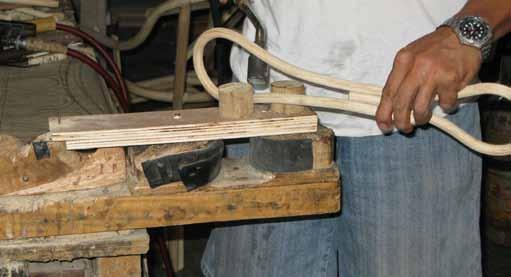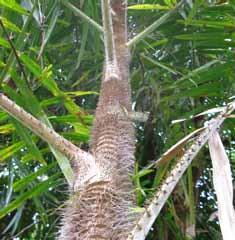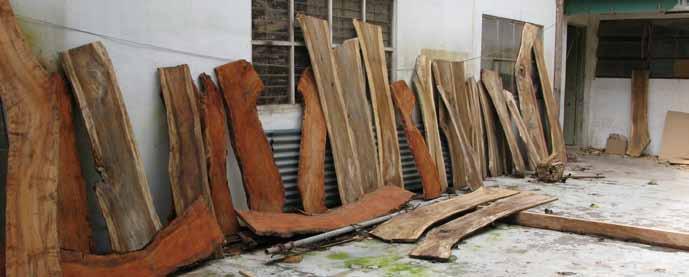
4 minute read
Enablers and Supporters MAJOR FUNCTION OF THE PLANTATION WOOD VALUE CHAIN
EnabLERS anD SUPPoRTERS of ThE PLanTaTIon WooD VaLUE ChaIn
EnabLERS anD SUPPoRTERS
Advertisement
ThE DEnR This national government agency plays many very important and varied functions in the plantation wood value chain. Its influence on the value chain cuts across many functions and ranges from provision of land and support for plantation development, formulation and implementation of harvesting policies to the imposition of forest charges, the provision of financial, logistics, and technical assistance up to “linking” or brokering with potential buyers and even the control and regulation of transport conveyances, markets, and/or destinations of products.
aCaDEmE The academe, particularly the Visayas State University (VSU, formerly the Leyte State University), in Visca, Baybay, Leyte has been a major player in helping upgrade the plantation wood value chain in Leyte, particularly those supplied by smallholder tree farmers. About 80% of these farmers own the tree farms while the rest are tenants. Through a project funded by the Australian Centre for International Agricultural Research (ACIAR), VSU implemented an extension research program that resulted in the publication of a tree registration manual which provided farmers with information on the requirements and procedures for tree registration. Current research focuses on setting standards for tree nurseries, which had been identified as a bottleneck that has limited the quality of trees produced in small-holder plantations. GIZ also supported the rainforestation project, which was implemented with private land owners who planted indigenous tree species in their farms.
ThE PhILIPPInE naTIonaL oIL ComPanY (PnoC) This company operates a geothermal power plant in Leyte, assists POs within forestlands under its jurisdiction over a range of activities from provision of seedlings, establishment of nurseries and plantations, preparation of Community Resource Management Framework (CRMF), Annual Work Plans (AWP), and RUP and the documents associated with these requirements, in enterprise and organizational management, and in the identification of livelihood opportunities for community members. PNOC had adopted a multiple-use approach in managing its forest resources, which is evident in the presence of abaca and other agricultural crops and livestock resources, along with rattan and timber resources inside its forests. NGOs such as FCI and development organizations such as GIZ likewise provide support to POs in their plantation development and in livelihood generation.
ThE DEPaRTmEnT of TRaDE anD InDUSTRY (DTI) This is the government agency mandated to promote entrepreneurship in the country. It can assist in product promotion, market identification, linking with buyers, and provision of training on various aspects of enterprise operation and management. BAHANDI, an organization composed of handicraft and local delicacy producers in Eastern Visayas, provides, with the support of DTI, GIZ and CIM, opportunities for its members to participate in trade fairs, publishes brochures about the members’ products and contact information, and maintains a website that links the members with potential customers in the outside world. Although DTI has launched the “One Town, One Product” (OTOP) program in collaboration with LGUs,
the program does not support nor focus its attention to plantation wood development and wood products promotion.
LoCaL goVERnmEnT UnITS Through the Local Government Code (RA No. 7160), LGUs have been mandated to become involved in the implementation of communitybased forestry projects and the management and control of communal forests and similar forest development projects in coordination with the DENR. Thus, in the harvesting, transport and marketing of forest products, LGUs are expected to play an important partnership role with the DENR. Among others, LGUs are tasked with the responsibility to confirm the existence of forest resources that are being targeted for exploitation and harvesting, through an assessment and actual inspection of the resources within their jurisdiction. Another important role of LGUs is the policing of illegal acts and abuse of natural resources.
The interview with the City ENRO in Leyte revealed the desire of LGUs to become more involved in the management of forest resources and to assume greater responsibility over communities and enterprises that were dependent on the forests, but lamented the fact that mechanisms for better coordination with DENR were not yet in place. Some key informants also believe that LGUs should be at the frontline in the protection and management of natural resources. LGUs are also seen as providers of technical assistance to local communities/constituents.
ThE ChambER of fURnITURE InDUSTRIES of ThE PhILIPPInES (CfIP) This Chamber used to have a presence in Leyte, but this link has been inactive in recent years.
The Forest Products Research and Development Institute (FPRDI) This Institute of the Department of Science and Technology has recently assisted Mr. Albert Chua in setting up a kiln dryer for the latter’s company in Ormoc City. The Technical Education and Skills Development Authority (TESDA), the government agency whose primary function is in management and technical skills development, has yet to be tapped by Leyteños for assistance in these areas.





